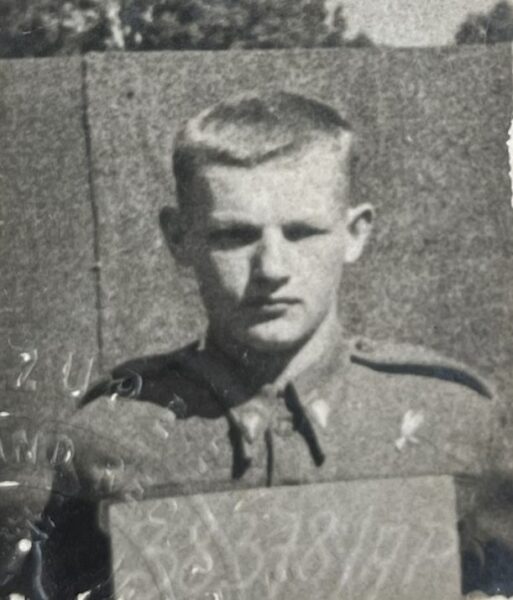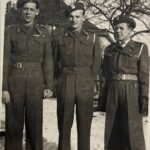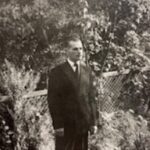Grzegorz Melnik
- Date of Death: 23 July 1990
- Place of Birth: Peremenka, Poland
- Place of Death: Nottingham, UK
- Date of Deportation: Arrived Alderney 10 February 1942
- Address when Deported: Peremenka, Eastern Poland
- Place of deportation: Alderney
- Sites deported to: Norderney,
By Yolanta Binns
My father Grzegorz Melnik was born 5/5/24 in Peremenka, a village near Kostopol in Eastern Poland. He came from a large family who were poor, living close to the land in a house where the livestock lived downstairs and the family quarters were above.
The following is a translation of his testimony, submitted through a German lawyer in 1983 to the UNHCR Hardship Fund for National Persecutees:
“On 15/12/41 the Germans captured me and took me from my home for forced labour, it was night time as during the day everyone would run away if there was a manhunt.
They loaded us into sealed goods wagons and for 3 weeks we travelled like this to Frankfurt. In Frankfurt we were immediately put onto another train and we travelled to St Malo in France. We were then loaded onto a small ship during the night and taken to Alderney. I arrived there on 10/2/42.
I worked there building bunkers for nearly two years. Conditions were very hard. We often had to work for 30-40 hours with no breaks. The organisation I worked for was called “Deutsche Bau”. The Germans would show no compassion and would abuse us, they beat us with truncheons for the slightest reason. It’s impossible to describe it all.
Shortly before the Allies landed in Normandy, the Germans transferred us from the island to Fiszer Lager near Cherbourg and there I continued building bunkers.
Work continued right up to the last day. The Germans wanted to transport us to Germany, but as soon as the train left Cherbourg and reached Valognes it was not possible to continue as the track was damaged. Everyone started escaping, in whatever way they could. I escaped into the forest and I hid there until the Americans came.
I spent 2 weeks in Normandy being cared for by the Americans. I then travelled to England at the end of June 1944 and was taken to hospital near London to recuperate. I had no papers, because the Germans did not issue anyone with any documents, the only thing I had from Poland was my school certificate.
I became ill with TB and was hospitalised at the Polish Hospital at Iscoyd Park in March 1950. I was discharged in 1956 and was able to start working in 1957. I spent more time in hospitals than I did at work. My health has suffered greatly because of those two years of hard labour.”
After my father had recuperated in hospital on his arrival to the UK in Summer 1944, he enlisted into the 1st Independent Polish Parachute Brigade and completed his training at Leven in Scotland. After the war ended he joined the Polish Resettlement Corps. After he was discharged from Iscoyd Park hospital in Sept 1956, he trained as a precision toolmaker and eventually settled in Nottingham, where he met and married my mother in 1965. I was born a year later. Both my parents were active in the Polish community in Nottingham, where he was a popular member of the Polish Parachute Brigade’s Ex-Servicemen’s Association.
With the change in borders in 1945, my father’s village was absorbed into Soviet Ukraine and despite communication being difficult, contact was established with his family and they were delighted to hear that he was still alive. Photos were sent, but contact stopped after 1967.
I remember my father as a quiet, gentle man who rarely showed his emotions, but who in his own stoic way could always be relied on to do anything for anyone who needed it- usually with a slight smile and measured assurance. He very rarely spoke about his time on Alderney, focussing instead on his experiences in the Polish Parachute Brigade, where he found great comradeship. His friends would sometimes refer to him as “The Alderney Survivor” and would comment about how much hardship he had suffered there. I remember on occasions being woken up whilst still a child by his nightmares and the next day my mother would explain that he had “returned back to the island”. One of his recurring nightmares was of being taken into a primitive isolation cell dug into the earth and being beaten with rubber hoses as a punishment for stealing some discarded potato peelings for himself and others.
My parents would occasionally compare their wartime experiences with an element of black humour: my mother being convinced that being a teenager in Eastern Galicia was more dangerous and unpredictable than his life in the camp. These conversations were the only times when he would reflect more openly and talk about a daily ration of water with a shred of cabbage or potato in it, regular physical beatings, torture and being constantly surrounded by hunger, fear and death.
Despite being cleared of TB years earlier, by 1963 he was suffering from chronic stomach ulcers and in 1979 he suffered the first of multiple heart attacks, the regularity and severity of which, combined with his stomach condition, resulted in him being regularly hospitalised and unable to work. I remember this being a huge issue for him as he felt strongly about not only needing to provide for his family, but also not to be defined- let alone defeated-by his wartime deprivations.
My father died quite suddenly on 23/7/90 from stomach cancer. He never spoke about his condition to anyone, nor that he had received a terminal diagnosis. I felt very lucky that a year earlier he had been able to see me graduate – my parents’ excitement was infectious and they had driven down from Nottingham early that morning with piles of Polish food. I remember looking up to the Gallery in the Senate House in Cambridge to find them, my father’s head was buried in his hands. It was the only time I ever saw him cry. When we found each other afterwards, there were no words necessary or sufficient – he didn’t stop grinning for the rest of the day.
Map
- Cemetery / Mass Grave
- Concentration Camp
- Forced Labour Camp
- Prison
- Worksite / Fortification


